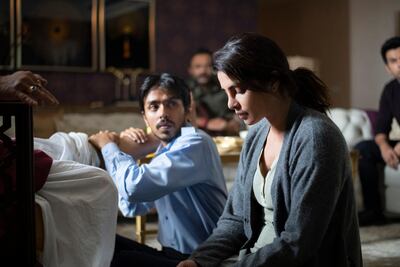Aravind Adiga's debut novel The White Tiger, with its themes of globalisation, individualism, social class and liberty, was a worldwide phenomenon when it was published in 2008. It made it to the New York Times bestseller list and also won the 40th Man Booker Prize that year. Now, it's been turned into a movie that will be on Netflix from Friday, January 22. Directed by Ramin Bahrani (Chop Shop, 99 Homes), The White Tiger stars Priyanka Chopra Jonas, Rajkummar Rao and Adarsh Gourav.
It's no surprise that Bahrani wanted to tackle the novel as he and Adiga studied English literature at Columbia University in New York at the same time in the 1990s, where they met and discussed each other's work. Open the pages of the novel, and you'll find it's dedicated to Bahrani.
"Aravind is one of my closest friends," says the director, 45, who is also a professor of English literature at Columbia. "We've been trading ideas, book scripts for almost 15 years. I remember him sending me early drafts of The White Tiger. I thought: 'This is incredible.' I waited for almost 15 years to make this film."
The White Tiger tells the story of Balram (Gourav), a young Indian man who refuses to accept that he is born to be a servant in India's casteist society. Coming from a poor village family, his academic acumen is unfulfilled as poverty means he has to abandon school. He gets a job as a driver to a hip young Delhi couple, Ashok (Rao) and his liberal Indian-American wife Pinky (Chopra Jonas). Everything is going along smoothly until a tragic car accident proves to be a stark reminder that no matter how nice Balram's employers seem, he will always be their underling. But Balram has other ideas.
"He's got some crazy visions about what he sees," says Bahrani about the character whose rise is a metaphor for India's economic miracle. He hunts riches and power without considering who he is treading over or what laws he breaks on his way up.
Chopra Jonas was a huge fan of the book when she read it a decade ago. "So, when I read in movie trade magazines that it was being turned into a film, I called my agents and said this movie is not being made without me," she says.
Naturally, when one of the world’s biggest stars wants to be in your movie, the director will not only say yes, but also work out how to make the part bigger. In the film, Pinky is an opinionated outsider who asks questions about the treatment of servants in her home, offering a direct challenge to the traditional caste system.
On a Netflix post-movie panel, Chopra Jonas revealed that her move to America and her marriage to singer Nick Jonas helped her understand her character's viewpoint. "Pinky Madam's spot is more pivotal in the movie than the novel. Ramin has given her character such an interesting perspective. I had so much fun playing her, especially because I'm an Indian who has lived in India, and now having lived in America it was interesting to take on one of my first Indian-American parts.

“The class disparity is something that exists throughout the world, but specifically in India. It’s something we’re afraid to talk about, we condemn it openly, but it still exists.”
It was also an opportunity for Chopra Jonas to act with award-winning Indian actor Rao (Kai Po Che!, Shahid, Newton.) "I've never played a character like Ashok before," he says. "It was tough also because I had to pick up an American accent, which made me so nervous because I didn't want to sound forced and cliched."
Rao empathised with Ashok. "He's also stuck and a victim of the system. He's a compassionate guy, he's ambitious, he's recently returned from America and has a milder personality compared to his wealthy and entitled family. So I tried to make him human."
But the actor who is getting all the plaudits is Gourav. He made his debut as a young boy, opposite Shah Rukh Khan in My Name is Khan (2010), but The White Tiger is his breakthrough. Variety magazine called him an outsider for the Best Actor Oscar. Bahrani took advice from celebrated Indian casting director Tess Joseph (The Namesake, Lion, Aladdin), as he searched for someone who could play Balram.

“I really wanted to cast a local, and my hope was to find a fresh face, who maybe wasn’t born in a big city and not from a wealthy family,” says the director, whose parents are Iranian.
“Then, one day, Adarsh showed up. He was kind of dressed the part. He didn’t have any shoes on, and he came in and sat on his haunches, and I thought he’s sitting down like people I know in Iran, this is how the working class in Iran sit. I immediately perked up, and hoped he could act.”

Gourav adds: "I had a couple of rounds before I met Ramin, so by the time we met, I had started to understand Balram a little more. I was never a big reader when I was growing up, but The White Tiger was one of those books that I read when I was 14 years old. So, I had a fair idea of what the story and character was."
Even so, once Gourav landed the role, he immersed himself into the character. He introduced himself as Balram and worked in a tea shop in a small village, then went to Delhi and worked as a waiter and dish cleaner.
“I absolutely hated it, but the whole idea of doing that was to understand how much Balram hated doing what he was doing in the village and then discover how insignificant, how invisible he was to society and people around him.”
Although the story is set in India, Bahrani wanted to play up the universal themes. "It's the story of a man who is trapped and wants to be free; who can't understand that?
“It encompasses class, money, health care, the judicial system, caste and classism. It sounds like I’m talking about America, right?”
The director is keen for the film to show the rage that forms when ordinary people witness systemic corruption. While the book was viewed as an attack on Indian elitism, Bahrani wanted the film to look at the global picture. "The last four decades have shown that there is corruption in democracy. We can feel it in America, in India, in any country in the world. And that simmering rage is Balram."
The White Tiger is on Netflix from Friday, January 22



